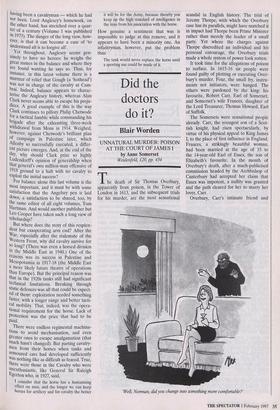Did the doctors do it?
Blair Worden
UNNATURAL MURDER: POISON AT THE COURT OF JAMES I by Anne Somerset Weidenfeld, £20, pp. 434 The death of Sir Thomas Overbury, apparently from poison, in the Tower of London in 1613, and the subsequent trials for his murder, are the most sensational scandal in English history. The trial of Jeremy Thorpe, with which the Overbury case has its parallels, might have matched it in impact had Thorpe been Prime Minister rather than merely the leader of a small party. Yet where the charges against Thorpe discredited an individual and his personal entourage, the Overbury trials made a whole system of power look rotten.
It took time for the allegations of poison to surface. In 1615-16 six people were found guilty of plotting or executing Over- bury's murder. Four, the small fry, instru- ments not initiators, were hanged. The others were pardoned by the king: his favourite, Robert Carr, Earl of Somerset, and Somerset's wife Frances, daughter of the Lord Treasurer, Thomas Howard, Earl of Suffolk.
The Somersets were sensational people already. Can, the youngest son of a Scot- tish knight, had risen spectacularly, by virtue of his physical appeal to King James I, to the place of first influence in England. Frances, a strikingly beautiful woman, had been married at the age of 15 to the 14-year-old Earl of Essex, the son of Elizabeth's favourite. In the month of Overbury's death, after a much-publicised commission headed by the Archbishop of Canterbury had accepted her claim that Essex was impotent, a nullity was granted and the path cleared for her to marry her lover, Carr.
Overbury, Carr's intimate friend and `Well, Norman, did you change into something more comfortable?' possibly at some stage his lover, had risen to influence alongside him. More intelli- gent than Carr, he was able to summarise for him the state papers Carr found so wearisome and perplexing. Overbury also seems to have known incriminating things about Carr's past, though it is impossible to discover what they were. A man of over- weening arrogance, he was not afraid to use his power when Carr's relationship with Frances set the two men at odds. The Howards, Frances' family, turned on Over- bury. So did the king, who with question- able legality sent him to the Tower for refusing the diplomatic post that had been intended to get him out of the way.
There Overbury was given allegedly poisoned tarts and jellies and, when those failed, the enema of mercury sublimate that supposedly killed him. Anne Somerset, handling the often intractable evidence with thoroughness and judgment, points to real difficulties in the prosecution's case. Carr always protested his innocence. Frances admitted her guilt. There is no doubt of her intention, though it seems possible that her plans were botched and that Overbury was killed not by design but by his doctors.
The Overbury case used to figure prominently in the history books, as both evidence and symbol of the decadence of the Jacobean regime. Recent historians find that perspective Whiggish. They con- centrate on the positive achievements of James's reign. Anne Somerset's book redresses the balance, vividly illustrating the ruthlessness and squalor of factional intrigue, the blatant sacrifice of public to private interest, the rampant competition of costly and luxurious display at court and, in the background, the baneful influence of wizards and quacks and con-men. If Jonson or Webster heightened or caricatured the social and political failings of the Jacobean world, no reader of this book will suspect them of inventing them.
Anne Somerset, an incisive and generally merciless drawer of character, extends indulgence (though not forgiveness) to Frances, 'perhaps the most sympathetic fig- ure in our story'. Women, after all, had a hard time of it in the 17th century, and she found her marriage to Essex a nightmare. Well, yes — and rape is the sort of lapse into which any gentleman might stumble after a difficult day at the office. Anne Somerset's pursuit of the woman's angle, and her decision to place Frances centre stage from the outset, occasionally impede her shrewd account of the male political conflicts to which the prosecution of Carr belonged and which ended his career. This is nonetheless a fine and absorbing book, based on fresh scholarship and fresh think- ing and deserving both a lay and a profes- sional readership.
Professor Blair Worden's most recent book The Sound of Virtue: Politics in Philip Sidney's 'Arcadia' is published by Yale.



























































 Previous page
Previous page